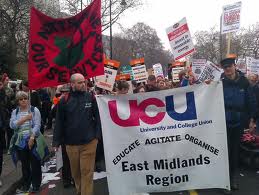According to the Trades
Union Congress (TUC), more than 150000 people participated in the march against
austerity and For a Future that Works in London on Saturday, 20 October 2012.
Affiliated unions up and down the country had mobilised, members from Unison,
the national teachers union NASUWT, the National Union of Teachers (NUT), the
Communication Workers’ Union (CWU), the University and College Union (UCU) and
others were clearly visible. The march was colourful, the mood buoyant, the
chanting intensive. Protesters were furious about the cuts to education,
privatisation of the NHS and large-scale restructuring in the public sector.
They signalled their willingness to resist. There was a feeling of empowerment,
of a possibility to go beyond the current ConDem government. And yet, is such
an optimistic assessment warranted?
In this post, I will
shed a critical light on British trade unions’ strategy against the austerity
budgets of the current ConDem government.
October 20 – struggle
against austerity or trade union ritual?
A march of 150000 people
is at first sight clearly a success. However, is this a correct evaluation when
looking at the general development over the recent 18 months or so? This was
not the first time that the TUC had called for a march against austerity.
Already on 26 March 2011, people had gathered in London to register their
opposition to welfare cuts (see Large
demonstration against ConDem cuts). At that time, however, there were
around 250000 people, clearly more than last Saturday (BBC News, 20 October 2012).
Compared with the march on 20 October, back in March 2011 there was a genuine
sense of a demonstration by society at large. Families with their children, members
of the public not necessarily closely involved with the labour movement
considered it important to be present. The difference could not have been
bigger this time round. The core of the demonstrators was made up of trade
union activists. Yes, unions had been successful at mobilising, but they mainly
reached their own activists, people who would anyway support their agenda and
come out if called upon. The wider population was hardly involved.
The assessment is even more damming in view of the public sector strike on 30 November 2011, when 30 trade unions had successfully co-ordinated strike action across the country over the government attack on pensions (see November 30). Many more demonstrations had taken place across the country on that day. When the demonstration in Nottingham reached the city centre, many bystanders showed their support through clapping, quite a few of them joined the march. There was a genuine feeling of a new beginning, in which broader society would be involved. Compared to these developments in 2011, the evaluation of the demonstration on 20 October has to be much more pessimistic. The smaller numbers on the march, which are not substantially improved by the 5000 people marching in Glasgow (BBC News, 20 October 2012) and the 1000 people on the streets in Belfast (BBC News, 20 October 2012), clearly indicate that the impetus of 30 November 2011 has evaporated. Why has this happened?
The assessment is even more damming in view of the public sector strike on 30 November 2011, when 30 trade unions had successfully co-ordinated strike action across the country over the government attack on pensions (see November 30). Many more demonstrations had taken place across the country on that day. When the demonstration in Nottingham reached the city centre, many bystanders showed their support through clapping, quite a few of them joined the march. There was a genuine feeling of a new beginning, in which broader society would be involved. Compared to these developments in 2011, the evaluation of the demonstration on 20 October has to be much more pessimistic. The smaller numbers on the march, which are not substantially improved by the 5000 people marching in Glasgow (BBC News, 20 October 2012) and the 1000 people on the streets in Belfast (BBC News, 20 October 2012), clearly indicate that the impetus of 30 November 2011 has evaporated. Why has this happened?
The public sector strike
and the related demonstrations on 30 November were a clear success. However,
trade unions failed to see it as a starting-point for a more sustained strategy
against austerity. Instead of setting a further date for co-ordinated strike
action, instead of planning further marches against austerity linked to 30
November, several of the health, civil service and teaching unions reached an
agreement with government in December 2011, while others such as the Public and
Commercial Services Union (PCS) walked out of negotiations and continued to
threaten strike action (BBC
News, 19 December 2011). The trade union front was split, some still talked
about joint strike action, but it all came to nothing in the end. A clear
opportunity had been wasted by a short-sighted focus on minor gains in the
immediate future. Unsurprisingly, what followed was a demobilisation of union
members and wider society up and down the country.
UCU – the art of
demobilisation
My own trade union, the
University and College Union (UCU), provides
an excellent example of how this demobilisation was carried out. As a result of
the improved government offer on pensions to public sector unions, USS, the
University pension fund, too had to demonstrate its willingness to improve the
pension scheme for Higher Education (HE). At a special HE sector conference in
London in January 2012, a majority of delegates supported the motion by the
union leadership that action was to be suspended to enter discussions, which
had been offered by employers. Only few concessions had been made and the
employers had not even talked about negotiations. Nonetheless, the UCU
leadership felt that suspending action was the way forward. It had always been
reluctant to co-ordinate strike action. USS would not be a public sector
pension scheme and therefore joint strike action would put no pressure on
employers in HE, it was argued. Rather than seeing the struggle against pension
cuts as a more general struggle for proper pensions for all, as a more general
struggle against austerity, there had always been a dominant view, which
evaluated cuts to USS in a rather narrow, HE specific way. Nevertheless, there
was a short moment in June 2012, when a more progressive, a more forward
strategy seemed to be possible. The national leadership was completely taken by
surprise, when a majority at the UCU annual congress in Manchester voted
against the recommendation of the UCU negotiators to continue with talks and to
continue with the suspension of industrial action. A majority of congress
delegates agreed that too little had been achieved to warrant such a passive course
of action. Industrial action was to be reinstated with immediate effect and a
period of industrial conflict for the autumn to be prepared over the summer.
Who expected the
national leadership to be active over the summer and mobilise members was soon
disappointed. Local associations were contacted and asked to put in place proposals
for action, but little else. When it came to the crucial HE sector conference
in September 2012, the national leadership circulated a motion to members,
which argued that only an all-out strike could be a successful way forward.
Instead of thinking in imaginative ways about how action could focus on
negative publicity for employers, potentially highly effective at a moment,
when universities feel under particular public scrutiny due to the first cohort
of students paying £9000 tuition fees arriving on campuses, a strategy going
back to the 1970s was put forward. It is doubtful that the national leadership
ever wanted that motion to succeed. Rather the objective was to scare members
off, to dissuade them from industrial action. They succeeded in that. From the very beginning, it was clear at the
conference in September that a majority had assembled in favour of suspending
again industrial action. The right within UCU had successfully mobilised to
avoid another surprise defeat, as it had happened at the annual congress in
June.
Nevertheless, while
successful on the day, what the strategy also implied was a complete
demobilisation of members more generally. Shortly after the decision to suspend
action over USS, the union held a ballot on industrial action over pay. While a
majority of members endorsed action short of strike, a majority rejected any
further strike action. The ballot was lost. Of course, pensions and pay are two
different issues, but members were unsurprisingly confused that their leaders
had first suspended industrial action and then shortly afterwards issued a new
ballot to endorse action. In the end, a decision was taken not to engage in
industrial action over pay this autumn. Overall, at the moment of the most
severe attack on Higher and Further Education, the union is at its weakest. The
signal to employers is clear, you can impose whatever cuts to pensions and pay
you want, UCU will not mobilise for action.
What next for a progressive labour
strategy?
What potential ways
forward can be identified? In my view, mobilisation has to start again from
below with trade union activists attempting to forge broader alliances through
concrete campaigns with other social movements. One example in this area is the
current local campaign in Broxtowe, an area in Nottingham, to save the NHS (Broxtowe – Save our NHS). Another
example is the European-wide campaign for the right to water and against the
privatisation of water provision, in which the European Federation of Public Service
Unions (EPSU) co-operates closely with other
social movements across Europe (Water
is a Human Right). It is this kind of broader campaigns with a focus on
issues beyond the workplace, which may provide a new impetus forward. The
alternative would be an exclusive emphasis by trade unions on how to service
the interests of their individual members best. The national leadership within UCU, for example, seems to favour such a strategy. Renouncing, however, a role in
wider societal debates would only imply further irrelevance of organised labour,
a situation which must be avoided at all cost.
Prof. Andreas Bieler
Professor of Political Economy
University of Nottingham/UK
Andreas.Bieler@nottingham.ac.uk
Personal website: http://www.andreasbieler.net
@Andreas_Bieler
@Andreas_Bieler
26 October 2012





Thanks for this. I'm glad to have been on the march, but I was disappointed in it as it did feel like a ritual. I also didn't like the fact that Ed Miliband spoke at the rally. Why was a pro-cuts politician speaking at an anti-cuts demo? There seemed to be some energy and creativity at the 26 March 2011 demo which seemed lacking on Saturday's march. It makes me
ReplyDeletethink that if you organise repeated marches to Hyde Park, it's a law of diminishing returns, so it's time to try something else. To be honest, the most exciting bit seemed to be the disabled people blocking Park Lane with their wheelchairs - both because it was unexpected and also because of how disabled people are bearing the brunt of the cuts.
I also agree with the critique of looking to Labour instead of trying to campaign actively for change. It's far too easy to look to politicians rather than doing the hard work of building active and vibrant unions and social movements. There's the further question of why support a party that invaded Iraq and wanted to detain people for 90 days, and which has recently shifted in a worrying socially conservative direction (as in the Blue Labour tendency). This is particularly relevant for UCU as we're not affiliated to Labour--so why should we be under any obligation to endorse them?